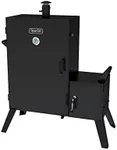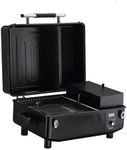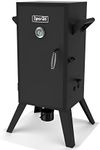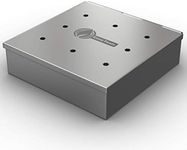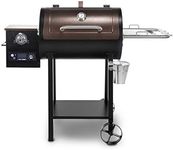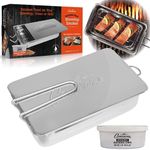Buying Guide for the Best Small Smoker
Choosing a small smoker can be a fun and rewarding process, especially if you love the idea of making delicious smoked foods at home but have limited space or only need to cook for a few people. The key is to focus on what fits your lifestyle, available space, and how much effort you want to put into the smoking process. Understanding the main features and how they impact your experience will help you make a choice that you’ll be happy with for years.Type of SmokerThe type of smoker refers to how the smoker generates heat and smoke. The main types are electric, charcoal, propane, and pellet. Electric smokers are easy to use and require little attention, making them great for beginners or those who want a 'set it and forget it' experience. Charcoal smokers offer a traditional smoky flavor and more hands-on control, but they require more effort to maintain temperature. Propane smokers heat up quickly and are easy to control, while pellet smokers use wood pellets for both heat and flavor, offering convenience and great taste. Think about how involved you want to be in the cooking process and what kind of flavor you prefer when choosing the type.
Cooking CapacityCooking capacity is about how much food you can smoke at one time. Small smokers typically have enough space for a few racks of ribs, a couple of chickens, or a small brisket. If you usually cook for one or two people, a very compact model will be enough. If you want to occasionally host a small group, look for a smoker with a bit more space or adjustable racks. Consider your usual crowd size and how much food you want to prepare at once to guide your choice.
Temperature ControlTemperature control is how you set and maintain the heat inside the smoker. Some smokers have built-in thermostats or digital controls, making it easy to set a specific temperature. Others require manual adjustment of vents or fuel. If you want a simple experience, look for models with easy-to-use controls. If you enjoy tinkering and learning the craft, manual controls can be rewarding. Your comfort with monitoring and adjusting temperature should guide your decision here.
PortabilityPortability refers to how easy it is to move the smoker around. Small smokers are often designed to be portable, with handles or wheels. If you plan to take your smoker camping, tailgating, or just want to store it away when not in use, look for lightweight models or those with features that make moving them easy. If your smoker will stay in one spot, portability is less important.
Ease of CleaningEase of cleaning is about how simple it is to keep your smoker in good shape after use. Some smokers have removable trays for ash and grease, or racks that are easy to take out and wash. If you want to spend less time cleaning, look for these features. If you don’t mind a bit of extra work, this may be less of a concern. Think about how much effort you want to put into maintenance when making your choice.
Build Quality and MaterialsBuild quality and materials affect how long your smoker will last and how well it holds heat. Smokers made from thick steel or high-quality materials will retain heat better and last longer, but may be heavier. Cheaper materials may not last as long or may not keep a steady temperature. If you want a smoker that will serve you for many years, pay attention to the quality of construction and materials.



